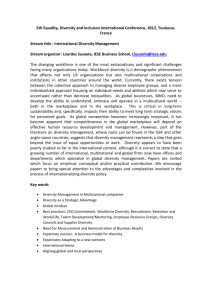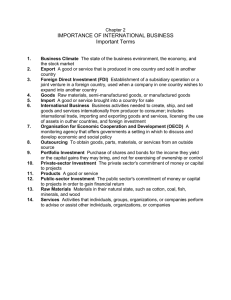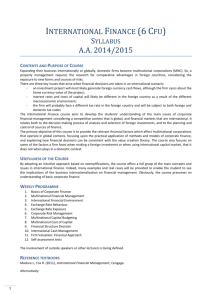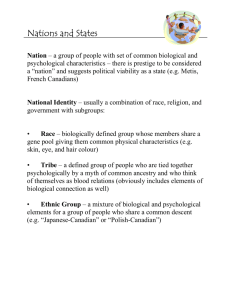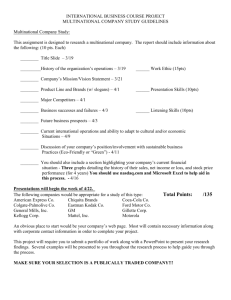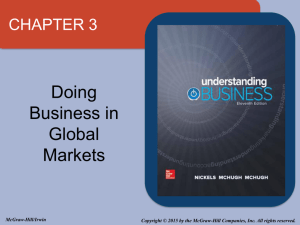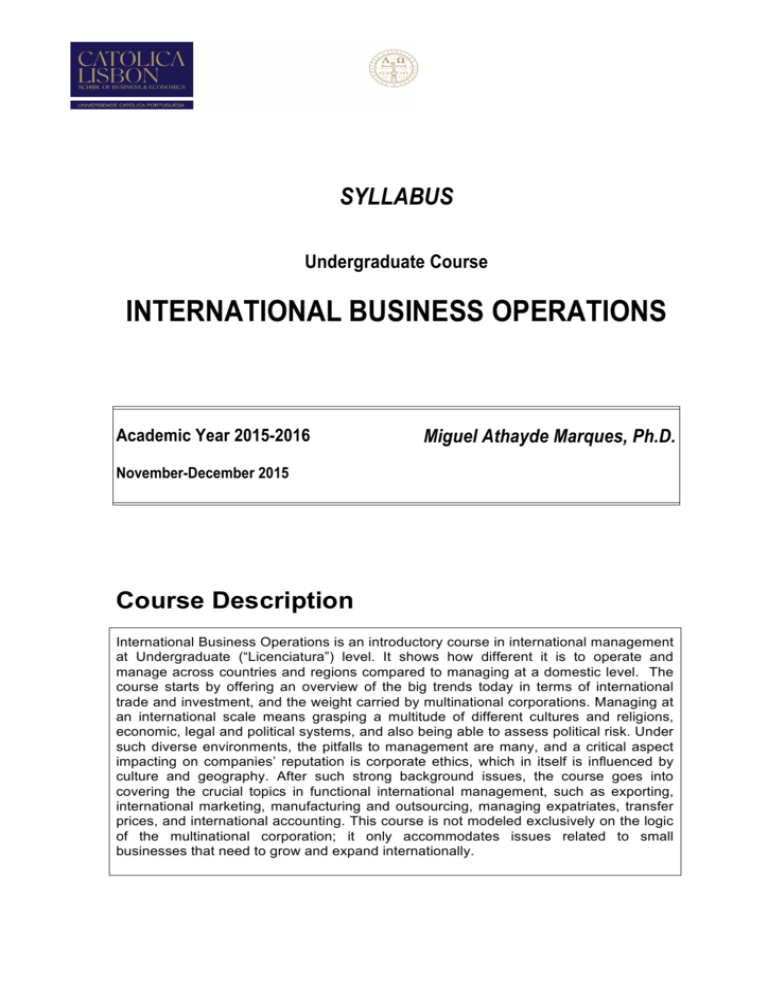
SYLLABUS
Undergraduate Course
INTERNATIONAL BUSINESS OPERATIONS
Academic Year 2015-2016
Miguel Athayde Marques, Ph.D.
November-December 2015
Course Description
International Business Operations is an introductory course in international management
at Undergraduate (“Licenciatura”) level. It shows how different it is to operate and
manage across countries and regions compared to managing at a domestic level. The
course starts by offering an overview of the big trends today in terms of international
trade and investment, and the weight carried by multinational corporations. Managing at
an international scale means grasping a multitude of different cultures and religions,
economic, legal and political systems, and also being able to assess political risk. Under
such diverse environments, the pitfalls to management are many, and a critical aspect
impacting on companies’ reputation is corporate ethics, which in itself is influenced by
culture and geography. After such strong background issues, the course goes into
covering the crucial topics in functional international management, such as exporting,
international marketing, manufacturing and outsourcing, managing expatriates, transfer
prices, and international accounting. This course is not modeled exclusively on the logic
of the multinational corporation; it only accommodates issues related to small
businesses that need to grow and expand internationally.
Contents
INTRODUCTION
International Business Operations – course description and methodology
An Overview of International Business
Perspectives on Global Trade and Investment
ENVIRONMENTAL DIFFERENCES
Culture
Governmental and Legal Systems
Political Risk
Ethics in International Business
EXPORTING AND IMPORTING
The Importance of Exports and Growth for Small Businesses
Improving Export Performance
Trade Financing
INTERNATIONAL PRODUCTION, OUTSOURCING AND LOGISTICS
How to Distribute and Where to Produce
Outsourcing Production: Make-or-Buy Decisions
Managing a Global Supply Chain
INTERNATIONAL MARKETING Globalization of Markets and Brands
International Market Segmentation
Configuring the Marketing Mix
Contents - continued
INTERNATIONAL HUMAN RESOURCE MANAGEMENT Staffing Policies
Managing and Developing Expatriates
Performance Appraisal and Compensation
INTERNATIONAL ACCOUNTING AND FINANCIAL MANAGEMENT
Investment Decisions and Financing Decisions
International Accounting Standards
Transfer Pricing
Tax Management
Grading
Students will be assessed on a permanent basis, as the course evolves. In this way,
assiduity will be required and taken as an input to the final grade, together with the
student’s level of active participation in the class. Two written class assignments will
be requested. In addition, there will be a final course exam. The weights for the final
grade will be the following:
• Exam - 65%
• Class assignments – 20%
•
Student class participation – 15%
Course Objectives International Business Operations aims at introducing the student to the particular
character of managing an international company. The course highlights the
differences between managing across borders and managing in a single domestic
environment. The student will be compelled to think out of his/her cultural mindset
and will be challenged to find solutions for problems typically faced by managers
who have international responsibilities. For this aim, the course will adopt casestudies derived from real-world situations. After attending this course the student
should:
• be able to distinguish what is unique about managing internationally;
• know the main trends in world trade and investment;
• understand the logic of the multinational corporation;
• comprehend the main issues in functional international management;
• perceive what knowledge and skills must he/she develop.
Bibliography
Recommended
textbook:
Recommended
textbook:
DANIELS,Christopher
John D.,A.Lee
RADEBAUGH
and Daniel P. SULLIVAN
• • BARTLETT,
andH.
Paul
BEAMISH
“International
Business
Environments
and
“Transnational Management: Text, Cases & Readings inOperations”
Cross-Border Management”
Pearson Prentice
Hall,
McGraw-Hill/Irwin,
Boston,
MaNew Jersey, NJ
th
2015,
edition
2011,
6th 15
edition
Class
notes,
each
student’sareresponsibility,
are considered
a funda• • Class
notes,
each from
student’s
responsibility,
considered fundamental
studying material.
mental studying material.
Miguel Athayde Marques
Lisbon, July 2015

